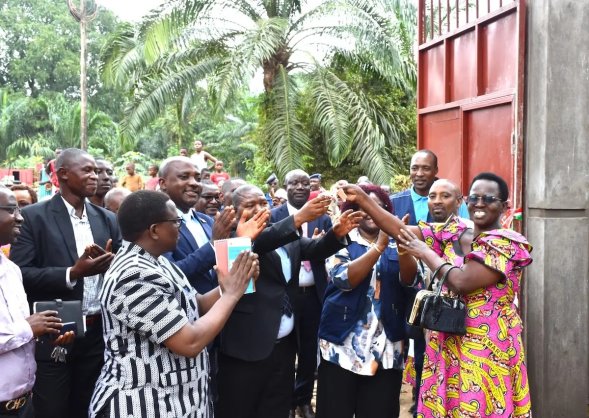
Beneath the shade of oil palms, a quiet yet powerful revolution is underway. The Dukundane Cooperative, led by women (95% of its members), stands as a beacon of resilience and innovation, having transformed a once small-scale activity into a thriving semi-industrial enterprise.
Founded in 2014 following women’s leadership training under the Women’s Peace and Humanitarian Fund (WPHF), the cooperative initially brought together women crafting and selling brooms from palm fibers. By 2020, they had taken a transformative step – launching artisanal palm oil production.
The foundation for this transformation was laid in 2018 under axe 6 of the WPHF, which supports the socio-economic recovery and political participation of women and girls in peacebuilding contexts. That year, 175 women peace actors and dialogue facilitators – locally known as Abakanguriramahoro or “women mediators”—received financial support in Karonda. These women had already been active in conflict prevention and community mediation.
With a grant of USD 180,000 from the WPHF, they expanded their economic activities using a holistic approach to palm tree valorization: from palm oil extraction to soap production from palm nuts and organic fertilizer from processing residues.
This marked a turning point in women’s economic empowerment in the region. Yet, the initiative still faced challenges due to limited equipment and technical capacity, underscoring the need for more structured support.
By 2025, with new backing from the Peacebuilding Fund (PBF) and UN Women, the group officially became the Dukundane Cooperative. With a total investment of 603 million Burundian francs, a modern semi-industrial processing plant was established with the help of the implementing partner FVS “Amie des Enfants.” The plant features: a Sterilizer, Sorting table, Destemmer, Kneader, Oil press, Decanters, Steam cooking pots, Water tank and Steam boiler.
Today, the cooperative processes 10,000 kg of palm bunches daily, yielding approximately 2,500 to 3,000 liters of oil under the Tamura Oil brand.
“We thank all our partners who made it possible to establish this semi-industrial unit capable of producing refined oil that can compete in the market,”
— Frida Ndagijimana, President of the 185-member cooperative, including 175 women.
A Tool for Peace and Empowerment
Beyond oil production, the cooperative now manages over two hectares of oil palm plantations. The facility includes a sorting shed, storage shed, staff toilets and changing rooms, and an office building.
With support from national technical bodies such as the National Center for Food Technology (CNTA), Burundi Bureau of Standards (BBN), Palm Oil Office (OHP), and implementing partner CREOP-JEUNES, Dukundane has become a national model for women’s economic empowerment and local development.
But the story doesn’t end with economic gains. This initiative is a concrete manifestation of UN Security Council Resolution 1325, which emphasizes the critical role of women in peacebuilding. In Karonda, that vision is now firmly rooted—and bearing fruit.
Distributed by APO Group on behalf of UN Women – Africa.



